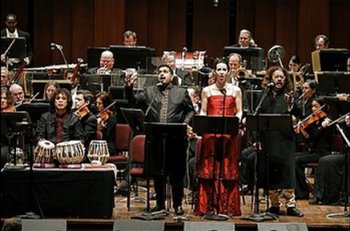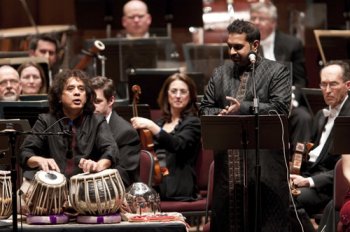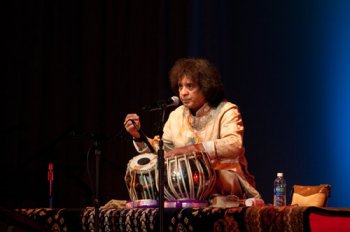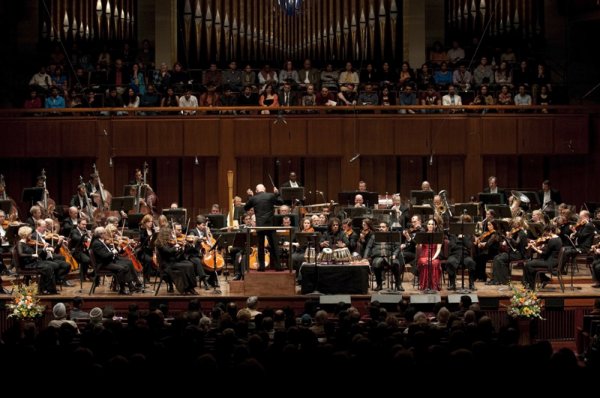
|   |

|   |
Zakir's charisma at the Maximum India Festival - Manjari Sinha e-mail: manjari@sinha.com Photos: Margot Schulman March 28, 2011 The John F. Kennedy Center for the Performing Arts (Washington DC) was throbbing during the month of March with a three weeks long Maximum India Festival (March1-20) showcasing the majesty and mystery of India's diverse arts and culture from folkloric to classical and contemporary. The unprecedented celebration delighted the overflowing audiences in Kennedy Center's multiple venues with India's classical and folk dances, music, theatre, films, literature as well as exhibitions featuring contemporary visual art and the finest crafts, textiles, jewels, art installations, cuisines and much more. The fascinating festival 'Maximum India' was presented in co-operation with the Indian Council for Cultural Relations, New Delhi and Embassy of India, Washington, DC.   The National Symphony Orchestra (NSO) presented three programs inspired by India for the Maximum India Festival conducted by the renowned music director Christoph Eschenbach. The world premiere of NSO commissioned "Concerto for Four Soloists' by tabla virtuoso, composer, percussionist and music producer Zakir Hussain, was featured on 3rd March at the Concert Hall. The NSO concert conducted by Christoph Eschenbach this evening, also presented excerpts from Roussel's opera 'Padmaavati'. The two works gazed each other from two different directions striking a cross over convergence.  Zakir Hussain's artistry is rooted in the soil of traditional Indian music but has branched widely into rock, jazz, fusion, bluegrass and all manners of world music. Widely considered an architect of the contemporary world music movement, Zakir's contribution in the realm has been unique with many historic collaborations including Shakti which he founded with John McLaughlin and L Shankar, Planet Drum with Mickey Hart, Sangam with Charles Lloyd and Eric Harland and recording/performances with artistes as diverse as George Harrison, Yo-Yo-Ma, Joe Henderson, Van Morrison et al. A prolific composer and recording artist Zakir received the first ever Grammy Award for Best World Music Album in 1992 for 'Planet Drum' produced with Mickey Hart. In 2009 his 'Global Drum Project' received another Grammy for Best Contemporary World Music Album. He was named an Old Dominion Fellow at Princeton University, where he was a visiting professor in 2005-2006. Among his collaborations with Fleck and Meyer is a triple concerto 'The Melody of Rhythm,' which received its premiere by the Nashville Symphony conducted by Leonard Slatkin, the former Music Director of NSO, in 2006. It was also recorded by the Detroit Symphony on Koch Records. On the world premiere of his new 'Concerto for Four Soloists' Zakir writes in the playbill, "We are not different from each other, and the ecstasy of discovering the sameness in ourselves is what this piece is all about. We claim to have our own personal route to creativity, but when we arrive at a destination or realization, we find that the others have also reached the same place. This journey could be undertaken through art, religion or devotion to any path. An Islamic Sufi, a Hindu priest and a Biblical preacher embark on a journey together convinced that they have nothing in common. As the journey unfolds and thoughts are shared, they realize with boundless joy that they can be friends and that their music and way of life bind them together in the strength of oneness." The concerto combined elements of Hindustani raga and tala, Sufi Qulam and Christian Church music. The lyrics were in Sanskrit, Hindi, Urdu and English and the four soloists comprised the Grammy Award-winning mezzo –soprano Kelley O'Connor, Shankar Mahadevan, Hariharan and Zakir himself.  Christoph Eschenbach conducts the NSO with special guests It was amazing to listen to the Western Orchestra comprising Violins, Violas, Cellos, Basses, Harp, Flutes, Oboes, Clarinets, Bassoons, Horns, Trumpets, Trombones, Tuba, Timpani, Keyboards, Organs and percussions following the different ragas and talas, for instance 'Rupak' of seven beats cycles, so effortlessly. Kelley O'Connor, the American mezzo-soprano's tuneful piercing voice tried to match the intensity and the free-wheeling improvisations of the Sargams and Aakaar Taans by Mahadevan and Hariharan. She and Hariharan in particular had a long and intricate dialogue in the final movement as a conversation of the two view points. The concert not only invited a thunderous applause from the audience but also helped them understand what John F Kennedy meant when he said, "The arts create a unique platform for understanding each other." Manjari Sinha has an MA in Sanskrit from Allahabad University, MA in Music from Vikram University, Ujjain; B.Ed. from Lucknow University; Sangeet Prabhakar in vocal, tabla, sitar and Kathak dance from Prayag Sangeet Samiti, Allahabad; and further training in sitar from guru Arvind Parikh in the lineage of Ustad Vilayat Khan. She contributes articles in English and Hindi on Music (Hindustani & Carnatic), Dance, Art & Culture for various leading music journals and periodicals. She gives lec-dems on Indian classical music and dance in India and abroad, interviews many musicians and dancers, and is an auditioned artist of All India Radio, broadcasting programs such as talks, interviews, Sanskrit programs and travelogue on overseas broadcasting. |